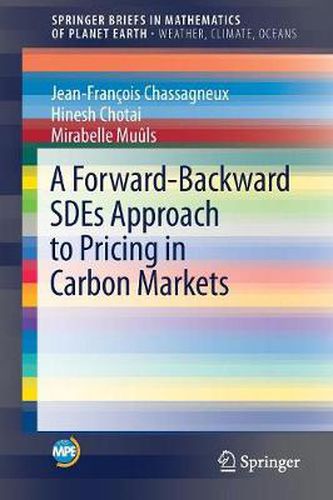Readings Newsletter
Become a Readings Member to make your shopping experience even easier.
Sign in or sign up for free!
You’re not far away from qualifying for FREE standard shipping within Australia
You’ve qualified for FREE standard shipping within Australia
The cart is loading…






This title is printed to order. This book may have been self-published. If so, we cannot guarantee the quality of the content. In the main most books will have gone through the editing process however some may not. We therefore suggest that you be aware of this before ordering this book. If in doubt check either the author or publisher’s details as we are unable to accept any returns unless they are faulty. Please contact us if you have any questions.
In Mathematical Finance, the authors consider a mathematical model for the pricing of emissions permits. The model has particular applicability to the European Union Emissions Trading System (EU ETS) but could also be used to consider the modeling of other cap-and-trade schemes. As a response to the risk of Climate Change, carbon markets are currently being implemented in regions worldwide and already represent more than $30 billion. However, scientific, and particularly mathematical, studies of these carbon markets are needed in order to expose their advantages and shortcomings, as well as allow their most efficient implementation.
This Brief reviews mathematical properties such as the existence and uniqueness of solutions for the pricing problem, stability of solutions and their behavior. These fit into the theory of fully coupled forward-backward stochastic differential equations (FBSDEs) with irregular coefficients. The authors present a numerical algorithm to compute the solution to these non-standard FBSDEs. They also carry out a case study of the UK energy market. This involves estimating the parameters to be used in the model using historical data and then solving a pricing problem using the aforementioned numerical algorithm.
The Brief is of interest to researchers in stochastic processes and their applications, and environmental and energy economics. Most sections are also accessible to practitioners in the energy sector and climate change policy-makers.
$9.00 standard shipping within Australia
FREE standard shipping within Australia for orders over $100.00
Express & International shipping calculated at checkout
This title is printed to order. This book may have been self-published. If so, we cannot guarantee the quality of the content. In the main most books will have gone through the editing process however some may not. We therefore suggest that you be aware of this before ordering this book. If in doubt check either the author or publisher’s details as we are unable to accept any returns unless they are faulty. Please contact us if you have any questions.
In Mathematical Finance, the authors consider a mathematical model for the pricing of emissions permits. The model has particular applicability to the European Union Emissions Trading System (EU ETS) but could also be used to consider the modeling of other cap-and-trade schemes. As a response to the risk of Climate Change, carbon markets are currently being implemented in regions worldwide and already represent more than $30 billion. However, scientific, and particularly mathematical, studies of these carbon markets are needed in order to expose their advantages and shortcomings, as well as allow their most efficient implementation.
This Brief reviews mathematical properties such as the existence and uniqueness of solutions for the pricing problem, stability of solutions and their behavior. These fit into the theory of fully coupled forward-backward stochastic differential equations (FBSDEs) with irregular coefficients. The authors present a numerical algorithm to compute the solution to these non-standard FBSDEs. They also carry out a case study of the UK energy market. This involves estimating the parameters to be used in the model using historical data and then solving a pricing problem using the aforementioned numerical algorithm.
The Brief is of interest to researchers in stochastic processes and their applications, and environmental and energy economics. Most sections are also accessible to practitioners in the energy sector and climate change policy-makers.